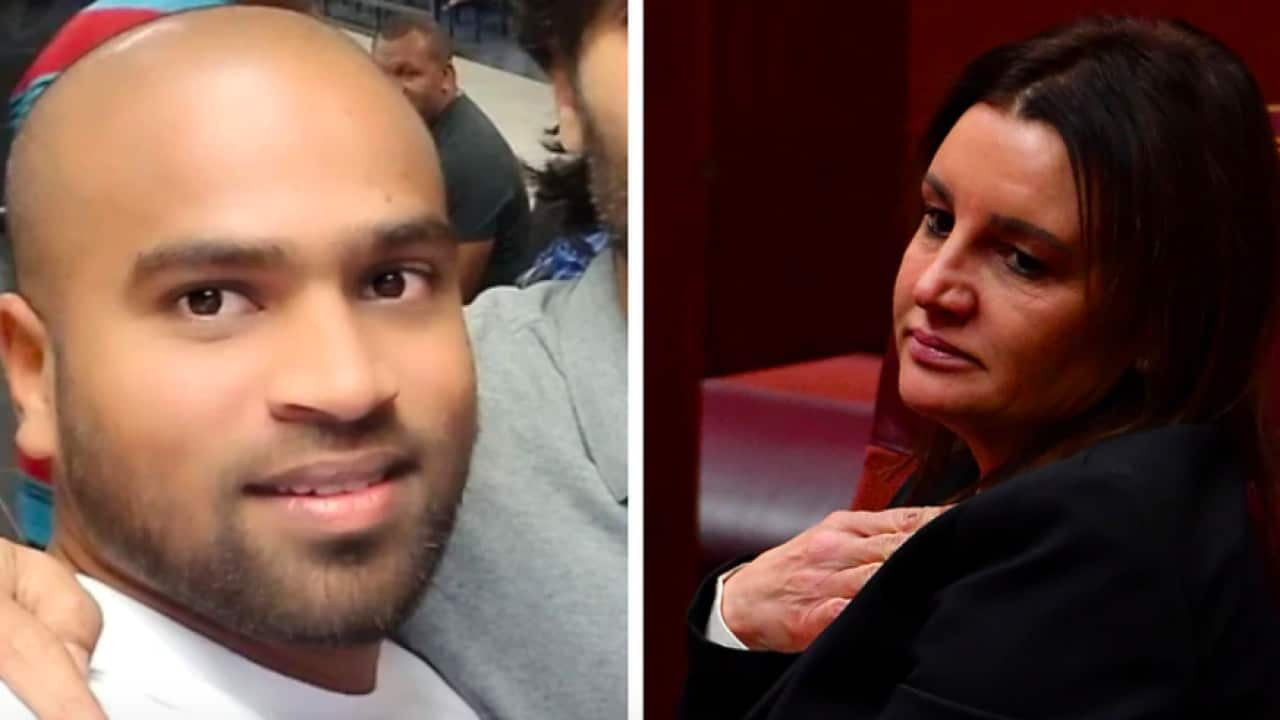Medevac supporters have described the repealing of the refugee medical transfer laws as a “dark day” for the Australian Parliament and people.
They’re calling for an alleged “secret deal” made between the Coalition and Independent Senator Jacqui Lambie to be made public after the crossbencher sided with the government.
A vote to repeal the contentious laws passed the Senate on Wednesday with the Coalition securing her crucial support to dismantle the laws. The repeal bill passed 37 votes to 35 on Wednesday, fulfilling a Coalition promise, after the so-called medevac had been passed against their wishes in February.
The repeal bill passed 37 votes to 35 on Wednesday, fulfilling a Coalition promise, after the so-called medevac had been passed against their wishes in February.

Senator Jacqui Lambie reacts at Parliament House in Canberra. Source: AAP
CEO of the Asylum Seeker Resources Centre Kon Karapanagiotidis called the Morrison government actions “depraved”, “indefensible” and "shameful".
“The only thing that has been jeopardised, that has been put at risk today is our national values and our basic morality,” he said.
“The responsibility with this doesn’t stop with Jacqui Lambie – it stops with our Prime Minister.”
Medevac laws were designed to give doctors more say in medical transfers of refugees in offshore processing.
The Coalition argues existing provisions were adequate before these laws were passed and their repeal will not result in poorer treatment outcomes. But Human Rights Law Centre Legal Director David Burke remains sceptical, describing the decision to repeal the medevac laws as “shameful”.
But Human Rights Law Centre Legal Director David Burke remains sceptical, describing the decision to repeal the medevac laws as “shameful”.

Minister for Home Affairs Peter Dutton and Prime Minister Scott Morrison at a press conference at Parliament House in Canberra. Source: AAP
“The Morrison government has ripped away the basic shred of humanity that when someone is sick they get the medical care they need,” he said.
“Before the medevac laws, the Government repeatedly failed in its duty of care to provide treatment to children, women and men.”
Prime Minister Scott Morrison has denied striking a deal with crossbench Senator Jacqui Lambie over the repealing of the laws.
He said scrapping the transfer provisions would restore integrity to border security after Senator Lambie's crucial support sealed its fate.
"We’ve always understood that that type of loophole doesn’t strengthen our borders it weakens them.'
It has been speculated the government could have agreed to send refugees from offshore processing to New Zealand after a similar arrangement with the US has ended.
Prior to the vote, Senator Lambie became emotional as she explained the reason for her decision, citing national security grounds for her confidential negotiations.
“I’m not being coy or silly when I say I genuinely can’t say what I proposed,” she told the Senate.
“I know that’s frustrating to people and I get that – I don’t like holding things back like this but when I say I can’t discuss this publicly because of national security I am being 100 per cent honest to you.”
But Labor’s Home Affairs spokesperson Kristina Keneally urged the Morrison government to disclose whether it has decided to pursue this option.
“The public has a right to know if the Government and the Prime Minister have done a backflip and decided to accept the New Zealand offer – they should announce that,” she said.
“This is a bad outcome for democracy. This is a bad outcome for people on Nauru and Papua New Guinea who need life saving medical treatment.”
Medical treatment for refugees in offshore processing
Since medevac laws were passed more than 180 people have been transferred to Australia from Nauru and Papua New Guinea.
There are more than 200 refugees and asylum seekers left on PNG and more than 250 remaining on Nauru.
Home Affairs Minister Peter Dutton said "people were already receiving" appropriate medical treatment before the Labor-backed medevac regime.
He described the legislation as a law designed to provide a "backdoor" to Australia, which was now closed.
“We've taken a decision today to strengthen our border protection policies," he said.
But Médecins Sans Frontières Australia executive director Paul McPhun argued refugees on Nauru and Papua New Guinea had been “block again” from accessing treatment.
“Preventing access to medical care as a policy tool is unethical and harmful to vulnerable people and the entire medical profession,” he said.
GetUp’s Human Rights Director Shen Narayanasamy is also concerned for what the repeal means for those currently in offshore detention.
“The reality is we don’t know what is going to happen to them,” she said.
“There are people there who have had two independent doctors assess their health situation and say that they actually need medical care.
“Currently nobody knows exactly what the exactly what the situation will be for those people.”
Senator Lambie's crucial support
Greens Senate Leader Richard Di Natale said there needs to be transparency over Senator Lambie's negotiations with the Morrison government.
“Right now there are people on Manus and Nauru who are depending on this legislation to give them access to medical care and that’s now gone,” he said.
“This is a very dark day, not just the Australian Parliament but most importantly for people who are languishing in offshore detention right now.”
Under medevac, two treating doctors could recommend a medical transfer to the Department of Home Affairs.
The request was then considered by the Minister for Home Affairs, who could deny this on national security grounds or if they have concerns on serious character grounds.
The minister could also deny on health grounds – in this event it goes to the Independent Health Advice Panel for review.










